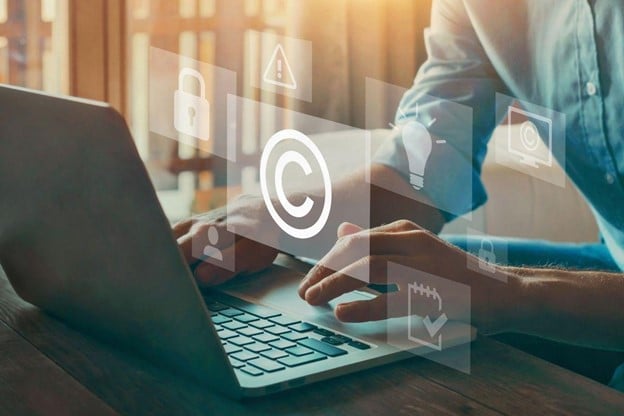
As a business owner, Intellectual Property (IP) is one of your most valuable assets. It is an essential part of ensuring that your lucrative products, services, processes, and ideas are not copied or stolen. As the owner of IP rights, it’s up to you to make sure that they are enforced. Nobody will secure or enforce them for you.
We've prepared this guide to help you thoroughly understand this crucial issue. Read on to learn about what IP infringement is and how you can protect your business and brand from it.
Are you looking to safeguard your business's intellectual property? IP Guardian can help. Contact us to book an appointment with one of our friendly experts today.
Intellectual property infringement occurs when an intellectual property right of work or product that is protected by intellectual property laws is exploited or used without consent by a competitor, past or present employee/contractor, or anybody else.
What is considered intellectual property infringement depends on the specific IP right in question — each kind of intellectual property has its own legislation.
There are a variety of different kinds of IP infringements, including:
Copyright infringement: A copyright is a legal right belonging to the creator of original work, such as a song or novel. Copyright infringement occurs when somebody copies or replicates this work without having obtained permission to do so.
Trade mark infringement: A registered trade mark is a symbol, design, word, or phrase that uniquely identifies an entity or the source of goods or services. Trade mark infringement involves unauthorised trade mark use in a way that is likely to cause consumers to believe there is a link between the product or service and the owner of the trade mark.
Counterfeiting: Counterfeit products are unauthorised or fraudulent copies of genuine products that intentionally deceive customers about their authenticity.
Patent infringement: A patent protects an invention from unauthorised sale, use or duplication. They can cover anything from designs to processes. Patent infringement is exploiting, creating, using, or selling a patented invention without the express permission of the patent owner.
Design Infringement: A design registration protects the unique visual appearance of a product. They can protect most physical products. Design infringement is when someone else uses your design without the permission of the design owner.
There are a vast number of ways in which intellectual property may potentially be violated. What is considered intellectual property infringements can include:

Intellectual property rights grant their owners the ability to exclusively use intellectual property. If another party infringes these exclusive rights, the intellectual property owner can seek compensation and access a range of available remedies.
Intellectual property can be bought, sold, and leased just like physical property, and IP infringement in Australia has similar remedies to other property rights. If an IP owner successfully pursues these rights legally, the court can award a number of different remedies.
Infringement may result in compensation being paid to the owner by the infringing party, or, if the infringing party has IP infringement indemnity the indemnifying party.
If infringers have gained financial benefit through their infringing behaviour, the court can order that the owner be paid all profits accumulated from improperly using their IP.
In instances where copyright infringement has occurred, the owner of the copyright may be entitled to take possession of those goods.
There are two types of injunctions. An interim injunction is a temporary order preventing further infringement while the court decides the merits of a case. If the court finds that infringement has occurred, it can then order a permanent injunction. This prevents the infringer from engaging in further infringing conduct. The infringing party or parties will require a licence from the owner of the IP if they wish to continue their conduct.
It should be kept in mind that in all these cases if the IP owner is not successful in their legal action, they may be required to pay the legal costs of the defendant.
Not everyone needs to go through the court system to enforce their IP rights. Alternative approaches are also possible:
Litigation in the court system is expensive and Alternative Dispute Resolution (ADR) approaches are increasingly popular. ADR is less expensive and more efficient compared to formal legal action, as well as protecting confidentiality and reputation. There are three main kinds: mediation, arbitration, and expert determination.
A legal representative can send a letter to an infringer requesting that they stop infringing IP rights. They may not have been aware that they were infringing rights, or did know but wanted to test the owner's appetite for enforcement action. A letter of demand often is enough to stop intellectual property violations.
After receiving a letter of demand, an infringer is able to request that an owner grant them a licence, which allows them to use IP in exchange for paying royalties. It's up to the owner to decide whether or not to grant the request.

Infringement of IP rights can undermine your market share and profitability, as well as harm the reputation of your business and its product or service. Guarding against IP infringement is of crucial commercial importance, and developing an infringement strategy is essential to the health of your business. An IP protection infringement strategy should always be tailored to the resources and requirements of your business. Strategic analysis should assess your IP rights and what actions you'll take in case of infringement.
Infringement strategies include elements such as:
Yes, registering intellectual property is vital in today's world. While enforcing intellectual property can be an intense process, it is comparatively rare. Very few businesses ever need to take legal action. The simple act of possessing intellectual property rights can serve as a deterrent to infringers. Most people and businesses won't deliberately infringe your intellectual property rights if they know you have the ability to obtain damages against them.
In the case that you do have to enforce your IP rights, you are also protecting the profitability of your business. For example, if an infringer is fraudulently selling goods that customers mistakenly believe they are buying from you, you're missing out on sales and running the risk that your reputation will be damaged. Either way, your business is losing income.
Another thing to consider is that if you don't register your intellectual property, a third party may register it as their own, forcing you to pay royalties or cease using it. This could potentially destroy your business.
There is a very good reason why most businesses take steps to secure their intellectual property, and why there are such many trademarks, copyright, design, and patents. Because it is prudent and necessary for a business to protect itself and its brand, processes and products.
Protecting your IP is not just your right — it's your responsibility. If you would like to obtain legal advice on identifying and protecting your valuable IP, contact IP Guardian today.

Registered Patent and Trade Mark Attorney with significant experience obtaining all forms of registered intellectual property. I hold a Bachelor of Science in Engineering, a Masters of Business Administration and a Masters of Intellectual Property. I’m passionate about showing my clients how they can protect their brands through trademark registrations.
I found them online and initially I was bit hesitant to talk to them about my problem but when I spoke to Barry, I felt more comfortable, and he gave me all the information and advice I wanted without even thinking that I am going to give him business or not. Finally, I went with them, and they made the entire process so smooth and easy for me. john was keeping us updated with each step he was doing. I would recommend these guys for any patent or trademark related service.
I would like to express my thanks to Barry and his team at IP Guardian in Sydney for their assistance with our recent Trademark application. Barry was highly professional, readily available throughout the process and clearly communicated expectations. Barry even helped us refine our application so that we had a greater chance of success which was very much appreciated to avoid extra costs. I would highly recommend Ip Guardian for all your Trademark and Intellectual Property needs.
Barry, last week, you and your professional team, made my year (or probably my next 21 years). So thank you so much for your executive, calm yet very effective actions under extream pressure. Elias Hajjar, Director, TROLLEYON PTY LTD
Informative, understood the business, what it needed and answered questions in a friendly and approachable manner. Easy decision to continue working with IPGuardian for future trademarking
From the day I contacted Barry Meskin until now with my silly amateur questions, he has been nothing short of amazing. I actually NEVER leave reviews anywhere, but I felt the need to do so for Barry and his team. I myself am a tradie, so I felt intimidated speaking to an attorney. But the second I spoke to him on the phone, he made me feel right at home. Never pressured me into any decisions, yet when I decided to go ahead with him, he delivered what I needed much quicker than what I was expecting. I cannot speak highly enough of him and recommend his services 100%.
The team at IP Guardian have made the process extremely straight forward and easy for us to understand exactly what was required. I will highly recommend to our clients who need help with IP.
I have dealt with Barry over the years, his advice and experience has helped me greatly. Looking for to working with him and his team again. Maher.
IP Guardian helps protect words, symbols, letters, numbers, names, signatures, phrases, sounds, shapes and smells. Yes, I said smells.
We've had the pleasure to work closely with Barry for many years. He has been exceptional to deal with and has a keen focus in providing a commercial led IP "go to market" strategy for start-ups and well known brands. Makes it easy and always advises on different ways to navigate through the IP process.
Barry Meskin @ IP Guardian is an experienced and extremely knowledgeable expert in the domain of intellectual property, patents and trademarks. In addition he has been extremely responsive and very professional in all our dealings. I wholeheartedly recommend Barry's services to any business or anyone seeking advice in this area - great quality and great value.